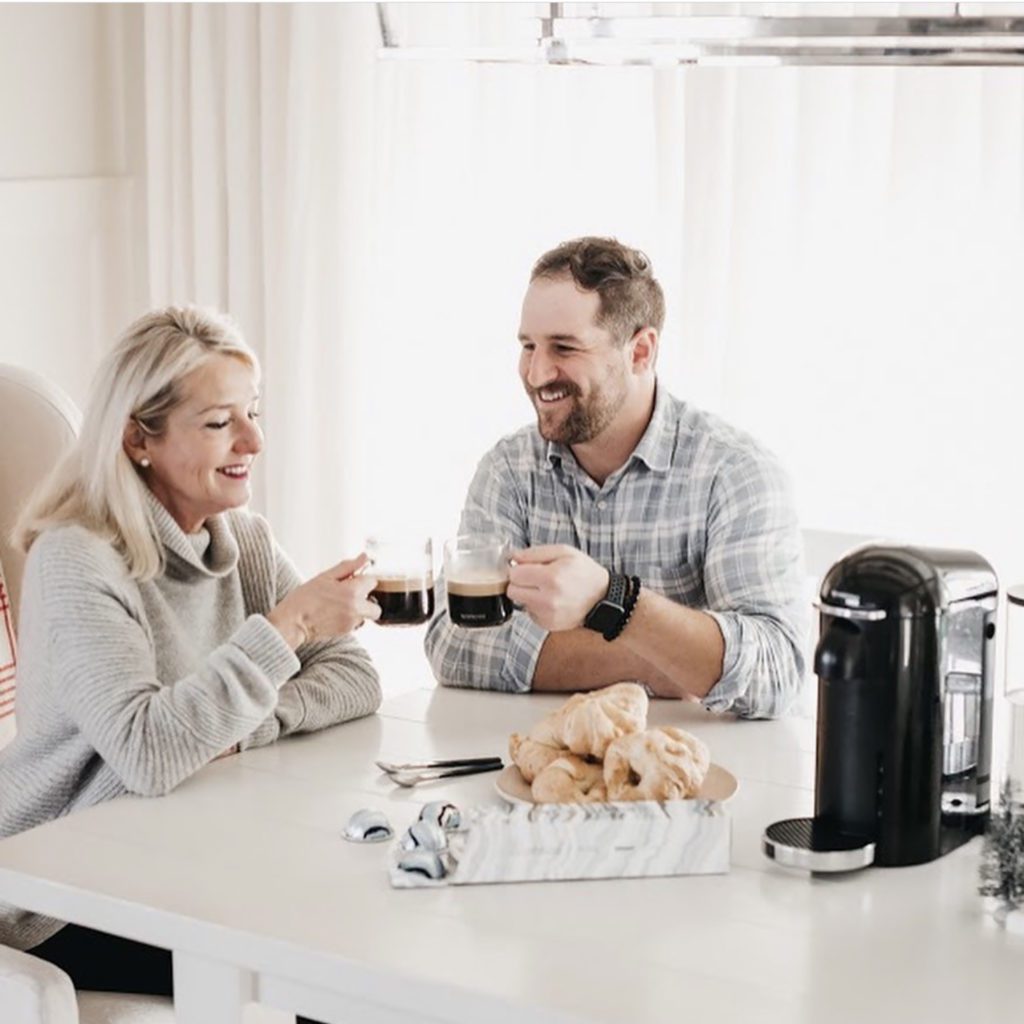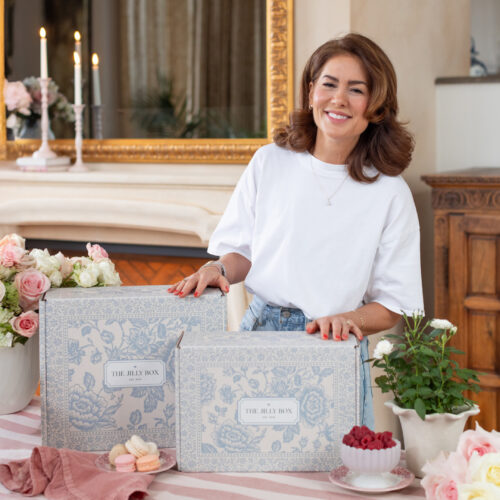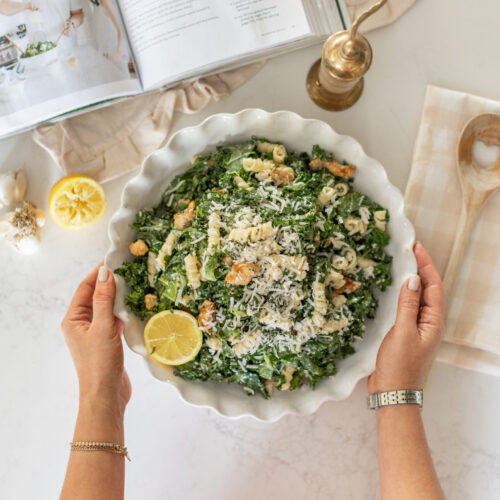Happy Wednesday, everyone!! If you’re anything like me, after ringing in the New Year, I am always reflecting on ways to improve our family routines … and I’m assuming that I’m not the only one! 🤪 With a busy work schedule and so many things on the go, I sometimes have trouble sticking to routines, but I know they are SO beneficial for the kids. With that being said, today, I am SO excited to welcome Justin’s mom, Melissa Pasutto to the blog. While balancing a teaching career (for 32 years!!) and raising two little boys (now adults!), she is here today to share how she balanced both with the help of daily routines!
Take it away, Melissa!!
Welcome to 2021! I personally have never been so happy to welcome in a New Year. Hearing global negativity on the TV during 2020 was so heavy for me. So, this year brings a fresh start, a clean slate and I can start to try new routines… again! Hi, my name is Melissa Pasutto. You may know me better as Justin Pasutto’s Mom, and Team Jilly has asked me to write an article on New Beginnings and New Routines this year.

I was contemplating that one of the reasons people are so excited to start fresh in the New Year is due to the high emotion felt with the Christmas season. We are reminded how much we love our families and that time spent together is the best gift of all, creating a desire to healthier, fit and have a more peaceful existence. We are human, though, and I think it’s just the nature of the beast to make resolutions, fail, start again and repeat. It’s hard for us humans at times to stick to routines, and we keep planning new ones. So, having said that, if you are in the mood to try maybe something different, read on.
Let me preface with I am actually not good at routines myself personally. As a parent and teacher, schedules were necessary. So aren’t you glad that Team Jilly asked me to write something on this topic? Truth be known, growing up, I was a free spirit; I was all over the place (routine wise) until I began my profession as an educator. Night owl had to turn into morning bird, no choices. When you have a birthday party of 29 under 7 waiting for you daily, you better be bright-eyed and bushy-tailed when you showed up at school or risk being eaten alive by seven-year-old children. In a Grade two classroom, there is no mercy. You can’t be late, kids don’t wait, and you better show up with your ‘best you.’ I became regimented. Ok, that sounds serious and dramatic.
As you are casually reading this, please remember that I’m have already admitted to not being a routine person personally, however, I do know a little something about the importance of routines, having taught elementary school for thirty-two years. The following is what I know to be true for me, and maybe that’s not you and that’s ok. If you are searching for a little gem or to tweak the flow of your day, then read on.
Some of you are going to rock your routines and it comes naturally for you. You have the calendar memorized in advance by heart (I have friends, and they know who they are (Tesha and Anna) you love routine and schedules because it makes life predictable and safe. But for the rest of us, it might need to become a learned skill, and that’s Ok. Now it’s time for the cold hard facts.

Routines help kids.
How? is what you ask. This is the note taking part.
1. Routine helps kids plan and make predictions about their future; this helps to develop their executive function.
Say what?? The executive function simply is their cognitive processes that are necessary for the cognitive control of behaviour. Well, that sounds important. Simply kids like to be aware and part of the plan, and if they are, it will reflect in their behaviour. A good example here is, every Monday and Tuesday, my grandson was not happy to be going to school. Pre-planning the night before, clothes laid out, backpack packed with snacks, cognitively he registered that school was the next day. Morning crisis and chaos alleviated. Happy child, happy parents.
2. Routines help kids feel independent because they can do part of the task themselves, like getting dressed; having said that children can’t be under pressure, it’s our job to allow enough time for the tasks.
3. Routine helps kids practice self-control, which is one of the most important skills a child can develop. Children with more self-control are better able to focus, better able to pay attention and ignore distractions. Self-control is basically self-regulation.
My recommendation and no I didn’t do this as parent but as a teacher I certainly appreciated it, create a morning and evening checklist. Depending on the age of your child prompt them with open ended questions like “What do you think you will need to go play in the snow at recess?”
The most important aspect of all of this to catch your child ‘doing good.’ Point out your child’s successes both in the morning and evening. Eventually weeks of your expert training, your child will begin checking off the list on their own. A morning and evening with a lot less mutiny and chaos, who doesn’t want that?
For some more ideas read on.
Ideally here’s what would be a fun family project and if I still had school aged children or my husband and I needed a new routine, wait a minute, we actually do, or at least I do need a new routine of course. So, I’ll do this activity along with you.
There are two parts to this activity. The first part involves scissors, paper and glue. Say what! Trust me just follow along and if you have time do activity number 1 with me. I’ll show you mine later if you show me yours later.

Visualize the Perfect Morning or Evening Routine and Manifest it- that’s where we are going with this activity.
Set you and your family up for success with your routines!
To do this activity you will need the following so go get these items first. Remember change takes change. Gather magazines or pictures from the computer, scissors, glue paper 8 1/2 by 11 or poster size if you are really buying into this fun activity.

Activity 1
Create a vision board of your morning, day or evening routine or just life in general. Choose whatever routine needs the biggest adjustment in order to create a happier environment in your home or a calmer you, more zen, whatever needs more fulfillment in your current life.
Step1: Once you have chosen the routine that you want to alter for example bedtime routine
either draw or look for magazine or computer pictures that represent all the steps to creating your perfect evening. Such as these recommended pictures, maybe begin with,
1. A delicious dinner and jazz music playing throughout the house
2. Family all having a conversation at the dinner table
3. A clean kitchen/post dinner walk/backyard playtime
4. Clothes being laid out for the next day, backpacks loaded with all school forms and requirements -you have time to figure this out in the evening, not in the am when everyone is sleepy
5. Bath or shower / mini snack
6. Grooming activities -teeth brushing
7. Hugs and kisses
8. Storytime/ Prayer time / Gratitude time- you and your child can think of three things that you are both thankful for
9. A quiet peaceful bedroom-a child sleeping
10. Holding hands with your Babe or significant other or reading the paper (no one does that anymore) or just having time to talk or a picture of a couple doing an activity of your choice.
This activity would be a fun weekend project where there is more time.
It also clarifies expectations and standards for everyone involved. Hence the reward is clearer communication and less room for conflict during the week

Activity 2
Ready?
Close your eyes, I’m serious- just try this, what have you got to lose? Picture what you would want your ideal morning or evening routine with your family or yourself to look like?
Now get a piece of paper or your journal, time to doodle, who doesn’t like to doodle? It’s fun you probably did it in school to pass some time away- just saying.
Draw your vision on the paper -stick people will do -doesn’t have to be a Van Gough -just have fun-spend 10 minutes.
Then actually-Write your vision down – putting your vision into writing commits your ideas and helps your vision to become clearer (trust me). Keep going; you are doing great -this will take another 10 minutes.
Come up with an action plan, to achieve this vision -break down the steps.
Use a timeline – (I’ll give examples later)
Call a short family meeting (10 minutes) you’ve got 10 minute’s right?
Show and Tell time – talk about the current routine and the hazards, ask them if they would like a different smoother and more calmer relaxing am or pm routine and would they like to be part of the plan?
Discuss your vision / routine with all affected family members.
Your discussion might go like this, you are the speaker, (meet at a table so they get the feeling with is a special kind of meeting).
Then start:
1. Purpose of mini family meeting
Why we are all gathered or (what you see when you look around this table) (just kidding family inside joke) set your family up for success. Tell them what the topic is.
2. Objective
To have happy and sane mornings (with no crying or raised voices) and evenings with bedtime being relaxed -no crying no screaming no kicking it up a notch and getting wild making going to sleep on time impossible -set the child or children up for success
3. Possible Results
Peace, calm, consistency, predictability, punctuality, safety ( no driving like crazy to get to school on time) avoiding road rage and actually in the mood for kisses and hugs while saying goodbye and or goodnight, more rested children, more rested adults, more time for loving between adults.
4. Rewards
The Ultimate Reward-You are setting your child up for success at school -Your child or children arrive happy and content (not frazzled by the morning routine) in the classroom ready to learn not unwind from a whirlwind of a morning other – trust me, I was a teacher and we can see the difference. It was almost sad to see children arriving to school with already having the disadvantage of being unorganized, forgotten their show and tell item or fieldtrip forms and or being tired or upset. This usually amounts to part of their learning in the morning gone.
5. Incentives
Aka the carrot stick for example it could be 5 evenings of going to bed on time (keep a record of it on a chart) maybe your child could earn (depending on each child’s leverage) a special outing, usually best not to have something of monetarily value, decide together what would be a special treat- they have to buy into the routine.
6. Schedule
Post the am and pm heavenly routine or routines on the fridge at children’s eye level so everyone can see it.
Make it happen! Cheers!
Melissa





So many great tips for success. I will be working on a vision board with my grandson the next time he comes over. Thanks Mellissa!
Well said Melissa.
I love the ideas of the visual boards. They work so well with children. I worked with parents for many years. We had a workshop called visual strategies. The parents loved it.
I love the idea of jazz playing. Do you have any recommendations on some great jazz artists or playlists to try out? I’ve been searching for playlists that will fit for our family. I’ve tried zen music, soft rock, spa music, meditative music and nothing feels quite right. I’d love to hear a few recommendations. Thank you for your post.